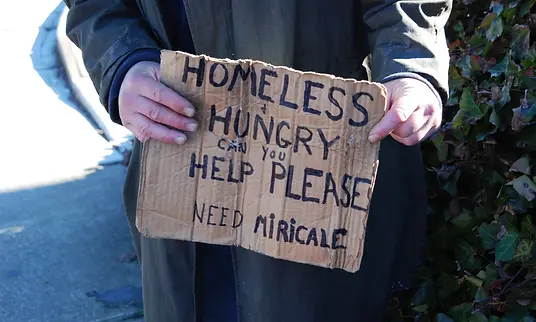WRITING
st. Louis on the air
As Afghan refugees face a hard landing in St. Louis, nonprofit leaders form Refugee Command Center
The International Institute of St. Louis is changing its resettlement playbook and asking outside nonprofits for help for the first time in recent history, as it struggles to keep up with the demands of resettling 300 Afghan refugees in 2021.
st. Louis on the air
St. Louis has yet to open a 'safe haven' homeless shelter this winter, despite federal funds
The City of St. Louis has millions of dollars in federal funding from the American Rescue Plan — but has yet to open a no-barrier homeless shelter this winter, even as temperatures drop dangerously low.
st. Louis on the air
How the 211 hotline fails homeless people — and leaves volunteers to pick up the slack
Officials in the St. Louis region often tout calling 211 as the best way to find a bed in the area’s patchwork of shelters. But homeless outreach volunteers say the government-funded system falls woefully short after regular business hours.
st. Louis on the air
Why Ste. Genevieve County residents are battling to stop a silica mine
Residents and farmers fear the 249-acre mine would contaminate their well water and tarnish a nearby state park by expelling crystalline silica dust into the air.
One resident said, “The only people in this town that are for this mine are the ones getting their pockets lined."
st. Louis on the air
How a gay St. Louis pastor triggered a war within the Presbyterian Church in America
Greg Johnson describes himself as a “gay atheist teenager” who fell for Jesus — and found himself at the center of evangelical Christianity’s internal battles over sexuality.
PCA pastors are now trying to banish clergy who identify as gay, even if they commit to celibacy.
st. Louis public radio
Family Continues To Sell Flowers For Jefferson Barracks Gravesites, Despite Losing Mom To COVID-19
For the past 33 years, Tina Stevens sold patriotic floral arrangements for graves at Jefferson Barracks National Cemetery to visitors nearly every weekend. But that stopped once she contracted COVID-19. Now, her family is taking over the family business to carry on her legacy.
st. Louis public radio
124-year-old stained glass company teams up with artist Cbabi Bayoc
A University City church enlisted artist Cbabi Bayoc's help to change how Biblical figures are represented in stained glass.
Despite never having worked with stained glass before, he accepted the job because growing up, he rarely saw Jesus depicted as Black. “Only on 'Good Times,'" he quipped.
st. Louis public radio
Coronavirus Pandemic Complicates How People Adjust To Life After Prison
The Missouri Department of Corrections releases about 19,000 people a year from its prisons, but many are finding it difficult to resume their lives. Prisons have limited resources to prepare incarerated people for reentry during the coronavirus pandemic.
st. Louis public radio
Missouri Loosens Laws Criminalizing HIV Transmission After 30 Years Of 'Faulty Assumptions'
For the first time since enacting HIV laws in the 1980s, Missouri will reduce the penalty for those convicted of transmitting the virus. Advocates and public health professionals are hopeful the new laws will lead to more people seeking HIV testing and treatment.
st louis on the air
Shirley Norris is 92 years old and has no plans to retire any time soon.
That makes Norris, a project manager for the Missouri Department of Transportation, the oldest full-time government employee in the state.
"It ain't broke," she said."So I'm not trying to fix it."
lindenlink
Just a few lanes away from her, in the open pool, 6-year-old Marialaura Villasana was mesmerized by dancers in the water.
“I was like ‘Oh my God, I want to do that,’” she said.
Twelve years later, this talent was Villasana’s ticket out of a country with a corrupt government and declining economy.
lindenlink
Senior year includes expected goodbyes, but for Carley Stigall, she never expected to say a permanent goodbye to the campus she attended.
Lindenwood-Belleville University leaders decided to shutdown undergraduate programs because of an unstable financial model based on too many athletic scholarships and not enough tuition.















